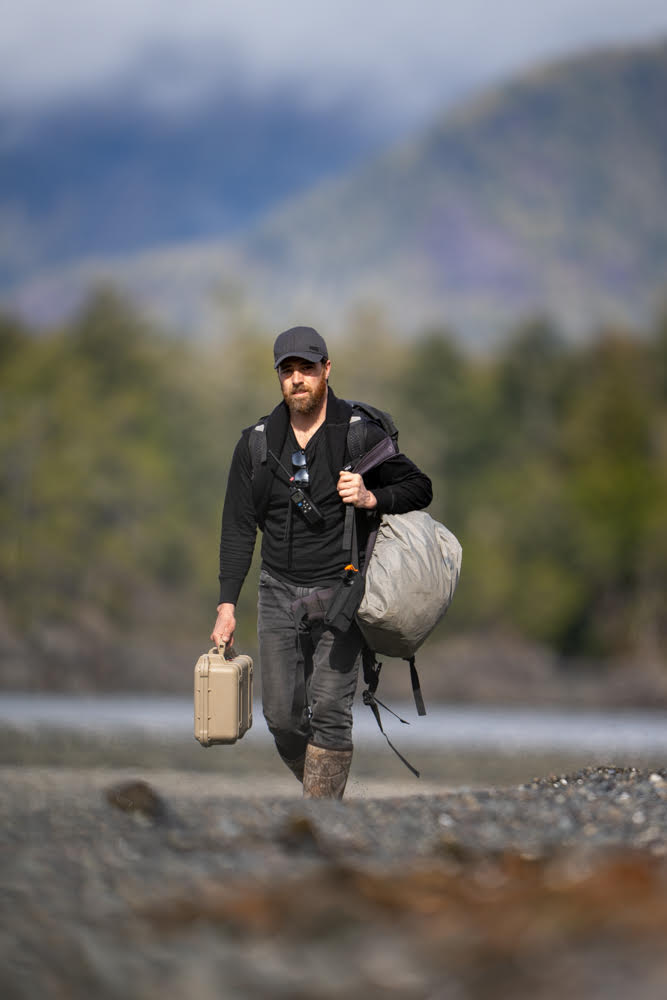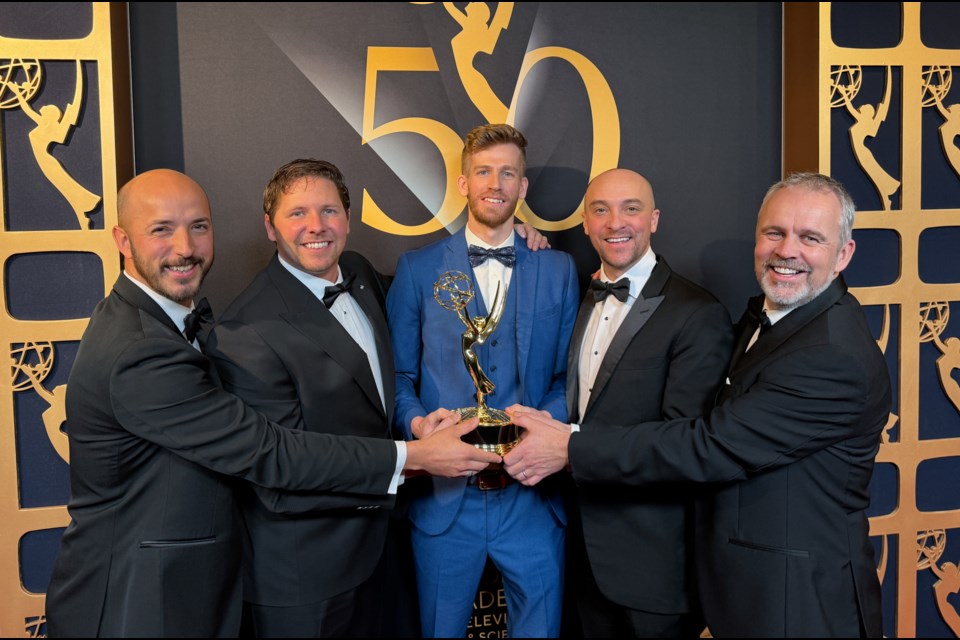For months during the pandemic, it was them, the sea wolves and the cameras. But on Dec. 15, at the 50th Daytime Emmy Awards, the world joined B.C. filmmakers in celebrating the unique lives of the now iconic species.
In mid-December, cinematographer and diver Maxwel Hohn of Pender Harbour travelled to Los Angeles for the awards ceremony on behalf of Island of the Sea Wolves, a three-part documentary on Netflix shot in 2021. After receiving seven nominations, they took home four Emmy awards: Outstanding Cinematography for a Daytime Non-Fiction Program, and Outstanding Single Camera Editing, Sound Mixing and Outstanding Writing Team.
“I’ve never actually watched the Emmys, so I didn’t know what to expect going into this. I was kind of going in blind, but I was told to get a fancy suit and show up,” Hohn said. He anticipated bringing home maybe one or two of the seven nominations they received, and was thrilled to earn four. The Outstanding Cinematography team included Hohn, Sam Ellis, James Frystak, Matt Hood, Darren West, Dave Pearson, Kieran O’Donovan, Robin Smith, Russell Clark, and Adam Ravtech. Jeff Turner, Chelsea Turner, Alex Burr and Lou Ferguson worked as directors and producers.
“The Emmy for cinematography is kind of like the Stanley Cup of wildlife filmmaking, so it’s pretty cool. Very special,” he said.
Hohn grew up in Pender Harbour and moved to Vancouver Island eight years ago for his career as a diver. Not long after accepting the Emmy Awards in Los Angeles, Hohn visited the Sunshine Coast with his girlfriend Cailin Lindsay for the holidays, where his family was very excited for him. Hohn credits his mother Pauulet for inspiring him to be creative and credits his father Rob for encouraging him to travel. Though Lindsay grew up in Gibsons, the couple didn’t meet until they crossed paths in Mexico. She recently became a divemaster and will work as a safety diver on upcoming shoots, relying on her background in healthcare as a nurse and paramedic.
“Everywhere we went, people were saying ‘Congratulations,’ and they were all very excited,” he said of his recent visit to the Coast. Many told him they were rewatching the series over the holidays or watching it for the first time.
For Sechelt's Tom McPherson, his involvement in the documentary was much more “under the radar.” As the director of Seaforth Expeditions, McPherson was hired to “put the cameramen in front of the wolves,” as he says. His company’s mission is to guide filmmakers and wildlife photographers to safely locating sea wolves — his specialty — while managing logistics in the field. He’d been told by one of the producers that the sea wolves would be the “throbbing heartbeat” of the storyline — no pressure, he jokes. McPherson relied on his knowledge of the sea wolves’ territories and what drives them. The wolves even know his scent. He hiked around 7,500 kilometres over the course of filming to track the population and determine the best locations to shoot in the difficult terrain. It was McPherson who found the gray whale that became a major food source for the wolves (and a reliable source for footage for the camera crew).

“I had a really wild experience where the alpha female led me to her den, which allowed us to install some remote cameras and capture some never-before-seen footage,” McPherson said. The task was like finding a needle in a haystack until he was able to follow the new mom to her pups. “Sure enough, I came up to this big cedar tree, and I can hear these little growls coming up from underneath.”
“It just comes down to, basically, a stubborn dedication to the task,” McPherson said. “And a lot of time in the field.”
The filming for Island of the Sea Wolves was done over the course of 10 months during the pandemic, which ended up being a boon for local filmmakers, McPherson said. While U.K.-based production companies would usually send out their own camera crew for such a project, travel restrictions meant Wild Space Productions had to call on B.C.-based cinematographers, guides and other locals and subcontracted Vancouver Island-based River Road Films. For Hohn, that meant some of the filming locations were only an hour’s drive away.
“It really allowed a lot of us to establish our foot in the industry and show they don’t need to send crews over from the U.K., and we’ve got lots of local talent here. Hopefully, that provides a bit more work for us in the future, and more work for other companies and guides,” Hohn said.
“It’s pretty cool and a huge accomplishment because it’s all the wildlife that surrounds us here in British Columbia. For it to reach such a global scale — on Netflix, it’s translated into like 30 different languages being broadcast worldwide — it’s pretty huge,” Hohn said, adding that he’s “proud to be part of a team that was able to make this documentary.”
Even for the people who may see these wild creatures in their natural habitat, Island of the Sea Wolves offered close-up, intimate interactions of iconic animals living through struggles and family dynamics. Hohn said the team had to rely on a lot of technology to achieve such shots, placing equipment in remote locations and “waiting days, weeks, months in hopes to get the shots and piece together the story.”
Those long hours, McPherson said, also developed friendships. “There’s thousands and thousands of hours spent in the blinds in the rain, not seeing anything, and just being cold and wet and feeling like a failure.” Then a poignant moment would arrive: an injured pup appeared to be left behind by the pack. McPherson said it felt like the story was falling apart — until the pup was reunited with an alpha male. For the crew, and later the audience, it was an “emotional roller coaster that goes hand-in-hand with following a wolf pack. It’s impossible not to get sucked into it and I think that was also part of the success of the story in the series.”
Since Island of the Sea Wolves, Hohn has worked on 10 more projects. His next project — Secrets of the Octopus for National Geographic — will begin streaming on Disney+ this Earth Day (April 22). McPherson says working with the documentary team was a career highlight, and it’s helped get his name further in the industry. He’s able to share that another wolf project he has been working on will be released on a major platform this coming fall. The story is just beginning.



